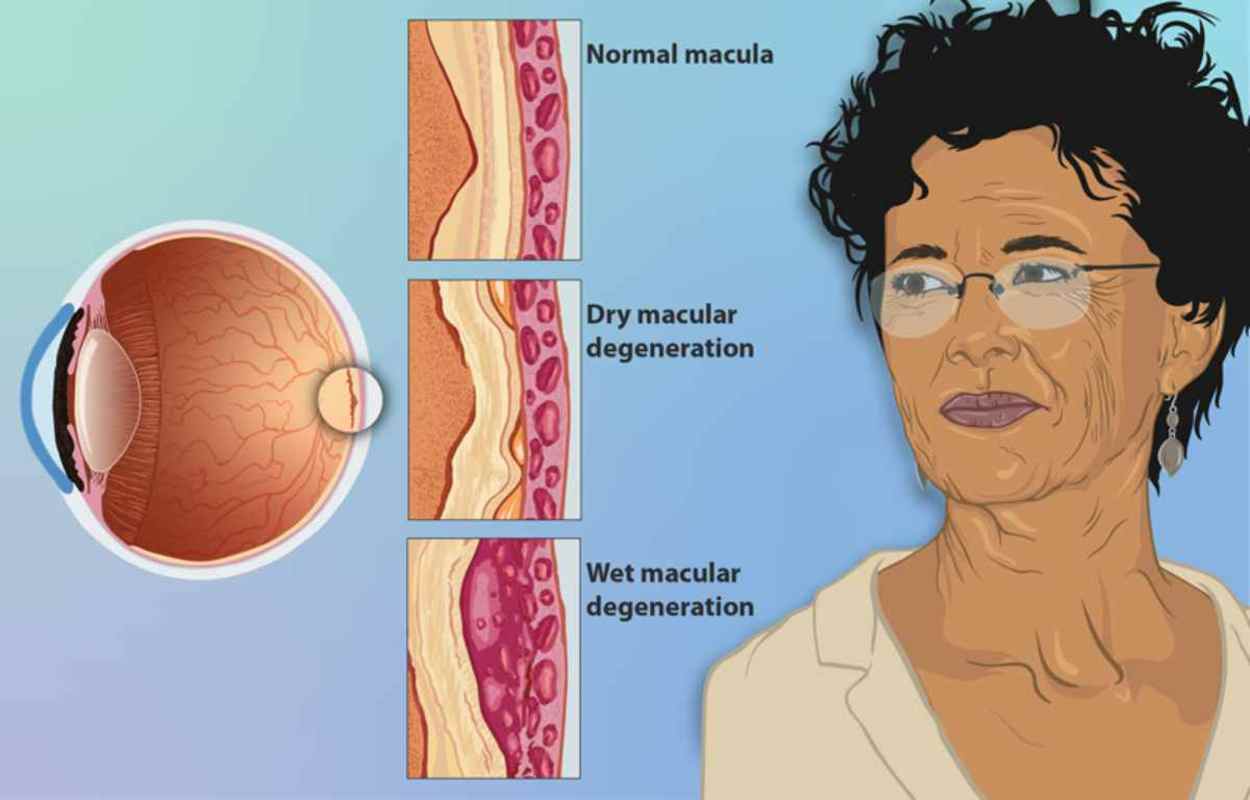Macular Degeneration and Fat Intake

Macular Degeneration: Recent research by several respected medical institutions confirms a link between macular degeneration and dietary fat intake that has long been suspected.
Researchers at Harvard School for Public Health and other nationally recognized organizations for public health point to a clear connection between the progression of macular degeneration and fat intake, and suggest that a diet low in fat and high in antioxidants like lutein and zeaxanthin can slow the progress of a disease that is the leading cause of blindness in older adults.
What is Age-related Macular Degeneration (AMD)
Macular degeneration, a condition defined by the gradual deterioration of the light-sensing cells in the retina, is the single highest cause of vision loss among people over age sixty. Public health officials estimate that some degree of macular degeneration is present in approximately ten per cent of American adults between the ages of 65 and 80.
In its earlier stages, those affected may see distortions of straight lines and suffer from a loss of central vision (the ability to distinguish details). As macular degeneration progresses, vision decreases and total blindness is often the end result. Over the last five years, several studies have pointed to a strong correlation between a diet high in fat and an increased risk of macular degeneration.
Diet For AMD (Age-related macular degeneration)
Researchers suspect that the same arterial build-up of plaque that contributes to heart disease may affect the eye’s blood vessels and lead to macular degeneration. If that is the case, a diet low in fat intake and high in antioxidants may prevent the progress of macular degeneration.
This theory is borne out by recent studies that point to a clear link between a diet high in fat intake and a more rapid progression of macular degeneration.
In 2003, researchers at the Harvard School for Public Health published the results of a five-year study that followed 251 adults over the age of 55 for five years, charting the progression of the disease and correlating it with diet and fat intake. The conclusions of the study suggest a strong link between macular degeneration and fat intake.
Therefore, a possibly sensible macular degeneration diet would be to lower your consumption of saturated fats while adding nuts, fish and Luthien-rich greens and vegetables.
The results are a clear indictment of macular degeneration and fat intake in the progression of this condition in ageing adults and suggest that a macular degeneration diet can help increase your eye health and limit your risk of developing macular degeneration.
Here are steps for you to consider for a macular degeneration diet:
- Limit consumption of red meats to no more than one serving per week. A diet high in fat from beef, pork or lamb increases the risk of macular degeneration. Eating more than one serving per week of beef, pork or lamb is associated with a 35% increase in the risk of developing macular degeneration.
- Decrease your intake of margarine, butter, ice cream, and whole milk.
- Avoid processed meats like hot dogs, packaged cold cuts, and bacon in your diet.
- Cut junk snack foods full of fat out of your diet.
- Increase your intake of tuna fish and other cold-water fish. People who ate tuna fish at least 4 times a week showed a 40% decrease in the risk of developing macular degeneration
- Go nuts! Literally, adding a daily serving of nuts to your macular degeneration diet decreases the progression of this condition. Those who included one serving a day of any kind of nut in their diet showed 40% less risk of developing macular degeneration.
- Eat lots of spinach and other leafy greens. A diet high in lutein and zeaxanthin is the most beneficial factor in lowering the risk of macular degeneration.
Read More: Causes and treatment of macular degeneration
Beyond Macular Degeneration and Fat Intake
In addition to just understanding the connection between macular degeneration and fat intake, it’s important to add foods (or supplements) rich in lutein and zeaxanthin.
The Harvard results suggest that people eating the most lutein and zeaxanthin had a 57% decreased risk of macular degeneration compared with those eating the least.
Lutein and zeaxanthin are found in dark green, leafy vegetables, and localize in the macula. So, when you think macular degeneration diet, think lutein and zeaxanthin!
The results of this study and others conducted over the past five years offer encouraging news for older adults at risk of developing macular degeneration.
Healthy diet habits lowered fat intake and increased consumption of lutein and zeaxanthin can slow vision loss, and prevent the progression of the leading cause of blindness in older adults.
We hope you have found our macular degeneration and fat intake page helpful.